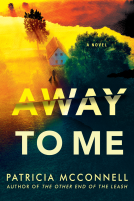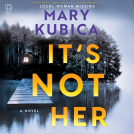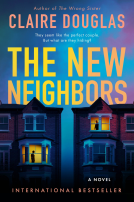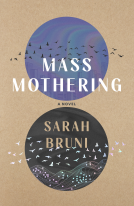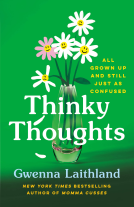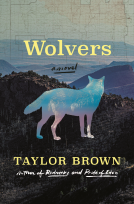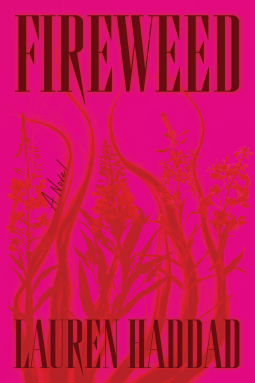
Fireweed
A Novel
by Lauren Haddad
This title was previously available on NetGalley and is now archived.
Send NetGalley books directly to your Kindle or Kindle app
1
To read on a Kindle or Kindle app, please add kindle@netgalley.com as an approved email address to receive files in your Amazon account. Click here for step-by-step instructions.
2
Also find your Kindle email address within your Amazon account, and enter it here.
Pub Date Apr 29 2025 | Archive Date Apr 15 2025
Astra Publishing House | Astra House
Talking about this book? Use #Fireweed #NetGalley. More hashtag tips!
Description
In the mowed-down industrial north of Prince George, Canada, “white trash” housewife Jenny Hayes shares a fence with the only First Nations woman in the neighborhood, Rachelle, and her two little girls. Jenny desperately wants a child and can’t understand why Rachelle, with her trash-pocked and overgrown yard, should have what Jenny wants most in the world. But Jenny tries to suppress her judgment as she has with her mother Fi, a cougar who chain smokes cigarettes instead of changing the full diapers of her boyfriend’s kids, and Missy, her best friend with Juicy Couture pulled tight over her baby bump and an unfurnished McMansion. Instead, she volunteers to babysit Rachelle’s girls— brushing hair, folding laundry, and ignoring the stilettos tucked under the bed in Rachelle’s disheveled home.
But when two young women—the strawberry blonde, blue-eyed Beth Tremblay and Jenny’s own neighbor, Rachelle—disappear along Highway 16, only Beth’s face and name are plastered on billboards and broadcasted over the air. Rachelle’s daughters are carted off by the state, and Jenny takes it upon herself to investigate. After all, Jenny thinks, who else is looking for her pariah of a neighbor? Jenny stutters through police encounters, asks the people living on the Rez all the wrong questions and ultimately faces—alongside the reader—the complicated motive behind her “investigation.”
With great awareness and care, Lauren Haddad’s portrait of Jenny brilliantly exposes first our impulse to seek the myths—as opposed to the realities—of race, class, and gender oppression in rural communities, and the consequences when our concern for others is clouded by self-preoccupation. Gripping, unflinching, and rebellious, Fireweed begs the question: just how good are our good intentions?
A Note From the Publisher
Author’s Note
On June 21, 2002 Nicole Hoar, a white middle-class woman, went missing on Highway 16 right outside Prince George, British Columbia. She wasn’t the first woman to disappear along the route but she was the first to receive national attention, the search for her urgent, a Canadian effort.
Monica Ignas, Alberta Williams, cousins Cecilia and Delphine Nikal, Ramona Wilson, Roxanne Thiara, Alisha Germaine, Lana Derrick. The disappearances, according to reports, date back to 1969.
Margaret Nooski, Mary George, Tamara Chipman, Aielah Saric-Auger, Beverly Warbrick, Bonnie Joseph, Emmalee Mclean, Madison Scott, Jane Doe, Anita Thorne, Roberta Sims, Frances Brown, Chantelle Simpson, Jessica Patrick, Cynthia Martin, Laureen Fabian, Crystal Chambers, Chelsey Quaw.
Eighteen women, twenty-seven women, more than forty women.
The numbers jump depending on the source. The majority of Highway 16’s—or what locals call the Highway of Tears—victims were Indigenous, a minority of them not yet women but girls.
I first heard of the Highway while studying herbalism in Vancouver, BC, and although I can’t remember the exact context of this encounter, I can still feel the emotions it whipped up. Those emotions intensified upon uncovering each disturbing detail.
I was indignant when I learned of the failings of the Royal Canadian Mounted Police. Aghast at the prejudice baked into the communities in the North. Another feeling surfacing: my own virtue affirmed. How could they let this happen?
The injustice of it all was heart-wrenching.
It’s this response that Fireweed aims to explore. I found myself drawn to the Highway like a fish to a lure, a sense of urgency thrumming through me, the adrenaline the consumption of true crime can inject. But my response to the Highway wasn’t as simple as this, a voyeur’s thrill at someone else’s gruesome end; the more I dug, the more I was faced with the misshapen truth of my interest in the Highway, the double-edged nature of my concern.
What is it I’m hoping to find when I seek out stories based on lived violence and oppression? If my interest stems from a concern for others, a desire to “do good,” in what ways is this concern clouded by self-preoccupation, a desire to prove my own blamelessness?
In 2016, after fifteen years’ worth of efforts by the Native Women’s
Association of Canada, the government launched its National Inquiry into Missing and Murdered Indigenous Women and Girls, its mission to reveal the root cause behind the staggering rates of violence.
Through the testimonies of families and survivors, a portrait of
colonialism as not a historic term but a persistent lived experience was portrayed, its violence enforced by the following four pathways: historical, multigenerational, and intergenerational trauma. Social and economic marginalization. Maintaining the status quo and institutional lack of will. Ignoring the agency and expertise of Indigenous women and girls.
It is this bleak reality that I chose to illustrate in Fireweed . By narrating the story in a voice like Jenny’s, I sought to lift a mirror to both our fascination with missing women and girls and the ways in which we can (often unwittingly) use the injustices faced by marginalized communities to confirm our own goodness; how by ignoring the agency of these communities, we end up centering ourselves. Jam, marinara sauce, ketchup, blood droplets: throughout the narrative, Jenny’s hands are stained red. By narrating the story in a voice like hers I sought to reveal how our failings can be yoked to our good intentions.
When I started writing the novel I hadn’t yet visited the city where
it’s set, but as a Detroiter, Prince George felt familiar. Home, at a time, to the most pulp and paper mills in the world and located in the northern reaches of BC, PG is a contradiction of wilderness and industry, a place versed in dualities. Each time I went up there,
the “truth” bifurcated. I was asked to hold how one can be both the perpetrator of violence and the victim of it, afforded privileges based on the color of one’s skin and marginalized based on one’s gender and class. How there is nothing more useless than “thoughts and prayers” and also— somehow— nothing more powerful.
On my first visit to PG I met Nicole Fox, who would come to serve
as my unofficial guide to the place. Randy Dakota, Angelique Merasty, Shirley Babcock, Norman Retasket: Fireweed , in many ways, was born out of the relationships I formed there.
In this I include my relationship with the plants—particularly
fireweed. Shooting up along the roadsides, in the charred remains of forests razed by wildfires, fireweed is what we call a vulnerary in herbalism. A wound healer. Fireweed is a novel that exposes our wounds, but it’s also intended to function as a salve: self-awareness as the first step toward effective action. Loosening the strings of the mask of concern we all might find ourselves wearing.
Marketing Plan
MARKETING AND PUBLICITY PLANS • National media campaign including print, radio, podcast, and online coverage • Pitch for feature stories, interviews, and profiles in major publications • Pitch novel excerpts and original essays • Select virtual events • Robust awards campaign • Target outreach to publications focused on women’s stories, Indigenous stories, psychological thrillers, debut fiction • Outreach to indie booksellers • Cover reveal on Astra House social media • Book club outreach and reading guide • Library promotion • Influencer outreach • ARC giveaways • Social posts
Available Editions
| EDITION | Other Format |
| ISBN | 9781662602900 |
| PRICE | $27.00 (USD) |
| PAGES | 288 |
Available on NetGalley
Average rating from 164 members
Featured Reviews
 Reviewer 1513010
Reviewer 1513010
Fireweed follows Jenny, a young Canadian woman whose husband is often gone for weeks at a time for work. In her spare time between infrequent work shifts, Jenny begins speaking a bit to Rachelle, the only First Nations Woman in the neighborhood. Just as the two women begin to strike up a relationship, Rachelle vanishes, and Jenny is determined to find out what happened.
This book felt more like a study of Jenny as a person than anything else. I don't think I liked Jenny, but I found her an interesting and fairly well-written character, and that's what sucked me into this book. She's a naive and ignorant white woman who's spent her whole life in the industrial town of Prince George. From the very beginning, the book is very upfront with how everyone in the town views First Nations people with Jenny's friends openly disparaging Rachelle. The book is written in first person, so we get to see everything Jenny's thinking and feeling while she goes on her journey. Her naïveté, combined with a healthy dose of crime TV, makes her overly confident in her ability to solve Rachelle's disappearance. She does some questionable things in her search for justice, but as the summary says, she really is misguided. She spends the whole book throwing herself at the mystery, and many of her assumptions about her hometown are challenged.
I also felt like the setting was very clearly described. I'm an American with only middling knowledge of Canada, so I wasn't familiar with Prince George at all before reading Fireweed. Haddad does a good job setting the scene with all the talk of the industry and environment, as well as the descriptions of all the characters. When I saw Haddad's bio at the end of the book and saw she'd written extensively about Prince George, the incredibly detailed description made a lot of sense. Also, as someone who has family in a small town in Missouri with that "white trash" air wafting around, the vibe of the setting and the people who lived there felt distantly familiar.
The ending has me feeling a little conflicted. Everything ties up quite neatly, but Jenny has just gone right back to where she was when the novel started. I can see it as an allegory for how women both Native and white continue to go missing, and nothing truly gets done to stop more women from going missing, just like how Jenny went on her journey searching for Rochelle only to return to her old life, Rachelle occasionally crossing her mind. The world keeps on spinning, unchanged. I find the ending unsatisfying, but I guess it makes sense for Jenny's character.
My main critique would be that the writing feels a little unclear at times. Sometimes something would happen, and it felt like some of the key details weren't provided until later when Jenny was reflecting on the events. Other times, Jenny comes to conclusions without providing explanation to how she reached that conclusion. It wasn't bad enough that I couldn't follow the plot, but it did leave me scratching my head every now and again.
Overall, I enjoyed Fireweed. The writing style was easy to get immersed in, and the premise was intriguing, and I never felt bored while reading this.
Rating 3.5/5, rounding up to 4
Content warnings for racism, sexism, sexual assault, mentions of domestic abuse
In Fireweed, the protagonist is a bored housewife who starts a misguided investigation into her First Nations neighbors' sudden disappearance. What starts as a well-meaning effort quickly spirals into a series of misguided actions that reveal more about the protagonist's own limitations than they do about the disappearance.
Set in 2001 in Prince George, BC, the novel offers a stark portrayal of a smaller rural working-class community. As someone who grew up in the rural prairies during that time, I found the depiction both accurate and occasionally difficult to digest. The community’s 'white trash' ethos and narrow-minded views, including prevalent racism towards First Nations people, are portrayed with a raw honesty that underscores the novel's critique of systemic issues.
One of the novel's strengths is its exploration of how women’s experiences of violence and disappearance are influenced by their class and race. The contrast in responses between the disappearance of a white woman versus that of the protagonist’s Indigenous neighbor highlights the deep-seated biases in law enforcement, media, and community reactions. The book’s portrayal of these dynamics, alongside other relationships and the mistreatment of women, underscores the systemic nature of these issues.
Ultimately, Fireweed serves more as a character study of both the protagonist and the community rather than a deep dive into the disappearance itself. The protagonist, with her naivety and sheltered perspective, can be frustrating to read. While I wished for a more in-depth exploration of the disappearances and the accompanying injustices, the novel’s focus on the status quo—where women continue to go missing with little change—resonates as a poignant commentary.
Thank you very much to NetGalley and Astra Publishing House for providing me with an ARC of this book in exchange for an honest review.
 Abby C, Bookseller
Abby C, Bookseller
The writing in this book is hauntingly melancholic as it follows a frustratingly naïve protagonist. Watching Jenny slowly descend into the realization that she is dealing with a broken system is heartbreaking and unnerving. I really enjoyed the ongoing motif of Fireweed, a plant that symbolizes new beginnings, always present alongside Jenny's continuous growth as she learns--or rather unlearns--the racist assumptions that have been embedded throughout her life. I wish we had some more time with Rachelle's character though, maybe even a chapter or two from her perspective, though I guess the point of her limited appearance was so the reader felt as isolated from the character as Jenny did. Overall, a really moving story and encapsulates the prevalent issue of missing and murdered Indigenous women, along with the overwhelming racism that allows this issues like this to persist.
 Hannah D, Reviewer
Hannah D, Reviewer
Overall, I enjoyed this book and I think it nearly succeeded in doing what it set out to do . The unreliable narrator with flawed motivations for "investigating" the disappearance of her neighbor was a compelling perspective. The premise was bleak, but somehow Jenny's own biases - and blindness to the ways in which she was also marginalized at times - filtered some of the despair that I think the reader was supposed to feel. Rachelle's clearly not coming back, something bigger is at play, but Jenny keeps us almost optimistic that Rachelle (or Rachelle's body) will be found eventually and that the cops can be trusted to investigate the missing woman. While I feel like Haddad maintained the perfect balance for Jenny's feelings throughout the story, true to form Jenny turned a blind eye (unknowingly or not) to so many wrongs that eventually the final act was a little muffled.
Definitely an interesting experience, and I think this has the potential to be an amazing audiobook! I think a talented narrator could really nail the vibe that this book was trying to pull off.
 Tara L, Librarian
Tara L, Librarian
This was a tough but amazing read. In the first part of the book, I was really cringing at the racism but Haddad did such an amazing job setting up how hypocritical it was. I thought the main character's journey was believable. She didn't do a dramatic 180 but went through very small changes. The descriptions of a rural town and the time period were so spot-on, it was a little eerie.
In "Fireweed," a white housewife named Jenny investigates the disappearance of her Indigenous neighbor Rachelle, who goes missing along with another woman. Despite her initial judgment, Jenny becomes involved in the case and questions societal perceptions of marginalized communities. The novel explores themes of privilege, bias, and the impact of our actions on others.
This book has evoked a multitude of emotions within me. I understand that it may not resonate with everyone, but it has certainly left a lasting impact on me.
Not long ago, I watched a film called Wind River, which shed light on the alarming number of Indigenous people who go missing or are found dead without anyone taking notice. This was a real eye-opener for me, and it made me appreciate the importance of stories like the one told in this book.
The characters in this book are incredibly well-developed and likable, making the story feel very realistic. The vivid descriptions of the environment further enhanced the plot, making it feel like a story that could easily happen in real life. While some parts may seem slow, they are necessary to tie the entire book together.
Overall, this book is a gripping page-turner that will leave you feeling pensive and emotional at times. It reads like a true story, drawing you in with its authenticity.
I highly recommend this book and encourage you to form your own opinion. It may be worth doing some research to understand the gravity of the issues addressed in the book. The struggles faced by the characters, such as Jenny's attempts to report Rachelle missing and being met with indifference, are sadly reflective of real-life scenarios. This book is truly remarkable and deserves to be read.
Thank you, Astra Publishing House for digital ARC copy. I am leaving this review voluntarily.
 OutlawPoet ., Reviewer
OutlawPoet ., Reviewer
This is a good, but tough read.
It’s really hard to be in the head of our MC at times – even when she starts to be a bit of a better person, I struggled to like her. I also felt that she read much older than she was supposed to be.
The story itself is a good, if painful, one.
It’s very much about how disposable women are – and how much more disposable non-white women are. I’ll warn you, the racism is pervasive and very, very real.
I’m glad I read this one, though it made me very sad.
• ARC via Publisher
Thank you to Astra Publishing House for providing this ARC for review consideration via NetGalley. All opinions are my own.
Fireweed is the story about a woman living in an isolated area of Canada living an increasingly suffocating life. When a national search for a missing young woman converges with the protagonist’s own neighbor’s disappearance, she becomes increasingly preoccupied with investigating. The story is complicated by the fraught race relationships between the First Nation and Indigenous people and the white Canadians in the town.
The things that I think the author did very successfully is create an atmosphere of claustrophobia and frustration in the main character. There’s a sense of voiceless ness and directionless that’s really highlighted by the brand names, store names, and clutter that are in so many scenes. The author highlights a very lonely middle class existence of a woman who is internalizing her problems.
The author does a wonderful job of showing that Jenny is using her past traumas, poor relationships, yearning connection, as the fuel for her investigation. At a certain point it’s clear that her search for Rachelle is much more about herself and her own identity and self esteem than a true closeness and concern.
What I do think was a little disappointing is that this book very much uses the missing and murdered indigenous women as a scaffold for a story of personal discovery of a white woman. While that may have been the aim for the author to show how white people can co-opt movements for their own reasons, it was disappointing that the storyline ends so abruptly at the end. I just felt like two paragraphs about Jenny feeling wistful in the last chapter wasn’t a fully fleshed ending for this storyline (even if she never ends up being found or getting justice.)
Fireweed by Lauren Haddad is a captivating blend of emotion, mystery, and self-discovery. The novel follows characters caught in the complexities of grief and resilience, set against a vivid, almost poetic backdrop. Haddad's writing is evocative, painting rich emotional landscapes that draw the reader in from the start.
The strength of this book lies in its character development and the way it navigates loss and healing. The relationships feel raw and authentic, making the reader care deeply about the characters' journeys. However, some parts of the plot might feel a bit slow, as the story tends to linger in introspection. But the emotional depth compensates for the pacing, keeping you invested until the end.
Overall, Fireweed is a beautifully written novel that explores human connection, trauma, and growth with grace and nuance.
Rating: 4/5
 Amy K, Reviewer
Amy K, Reviewer
This is a whirlwind of a story taking place in Canada, where the industry is mining and paper production from trees. Life here can be uneasy. A young couple living here and struggling to make ends meet (she works in retail, he works in the mines) is suddenly confronted with an unimaginable event: Their neighbor, a single mom who is a native, has gone missing. Her children have been left behind. But is she really missing? And, do the neighbors or police even seem concerned? The descriptions of the rugged landscape (including fireweed plants), the reports of other missing persons, and the possibility of an unreliable narrator set up a story that feels ready to combust with tension and suspense. I kept returning to this eerie place and wondering what would happen next!
 Annie F, Reviewer
Annie F, Reviewer
So so so good! Definitely agree with the comparison to Tana French. The ending felt a bit abrupt but I was okay with it given the overall themes of the book. Thank you Netgalley for the ARC and I will definitely be following this author on Goodreads!
This a fiery and passionate novel about family, love, and the complexities of identity. It's a powerful and moving story that will stay with you long after you've finished reading.
 Reviewer 882022
Reviewer 882022
The vivid, wild setting and the looming threat of an unreliable narrator make this a gripping read that’s tough to put down. Each page builds suspense, pulling you deeper into its mysteries.
The writing
I highlighted so many passages in this book - I must try and remember to come back to this review after the book has been released, to share my favourites with you! I found Haddad's writing style really elegant - some beautiful language and imagery, but without overburdening or purple style choices. A lot of time in this book is spent in the mundane and melancholy, and I found myself transported into these little vignettes (and not bored at all).
Haddad's writing reminded me a lot of some of my favourite works from Ottessa Mosfegh - the melancholy of My Year of Rest and Relaxation, and the unsettling and unreliable narration of Death in Her Hands. I flew through this book and did not struggle to follow or have to check things (though I did happily assume anything odd was down to unreliable narration).
The main character
Jenny is a flawed and unlikeable character, at least to me, but not a flat one. I found her wholly developed and believable, at times I pitied her and at times I wanted to shake some sense into her. I think the context of her life is well developed, and Haddad paints a picture of family, friends, and partner relationships that provide ample tinder for Jenny's behaviour and reasoning.
At times she's an unreliable narrator, with her emotional states influencing her inner thoughts and reasoning to the point where she sometimes makes wild and insensible leaps of logic. I can see how this might leave other readers a bit lost - I has interpreted these leaps as reflecting Jenny's inner turmoil, and I very much enjoyed the inclusion of these passages and felt it added a lot to Jenny's characterisation and the context for her behaviour. There are things introduced that could feel like loose threads, or red herrings, if you're reading this from a place of trying to figure out what happened to Rachelle or (view spoiler). Personally, many of the things that Jenny thought or fixed on were immediately suspect to me and so I never tried to figure out how things fit in the big picture.
Centring a white narrative
This book loosely covers the disappearance of Jenny's indigenous neighbour, and her subsequent interactions with the indigenous community as she personally investigates what happened. As other reviews have covered (and in much greater detail than I will), this includes mention of the Highway of Tears and the Missing and Murdered Indigenous Women and Girls. While these real and traumatic events are featured, they are considered only from Jenny's naive and reductive perspective, and therefore not really given the weight and consideration that they might deserve.
Personally, I read this book as being a detailed but excoriating exploration of a character who exhibits white saviour, white feminist and Pretendian sentiments at various stages of the book. I could not find an interview or similar with the author to explore this in more detail, but certainly my own interpretation of this character and the book as a whole was not endorsing of Jenny's behaviour or reasoning but was instead an obvious criticism of how white women centre themselves in the narratives and experiences of non-white women.
As a white woman, I found this angle to be of personal interest to me and was anticipating a problematic character. I do think this book needs to be correctly billed - the representation of indigenous characters is reductive and flat, and I think Haddad's intentions could likely still have been achieved if she'd presented a more nuanced view. We only see these characters through Jenny's eyes, and thus with her harmful stereotypes and inner thoughts.
Conclusion
I will be careful in how I recommend this book - it is not a mystery thriller, it is an exploration of how one white woman in a small town attaches herself to her missing neighbour and inserts herself into a narrative of her own construction. That was a fascinating read, for me, and the writing made it truly enjoyable.
However, this book does take an incredibly reductive and harmful perspective, and I would not talk about it or recommend it in the context of MMIWG, own voices or first nation perspectives. I don't feel qualified to comment on the release date timings, but would agree with other reviewers who do not feel this title should be attached to the National Day for MMIWG or even part of that conversation.
Wider reading
This book does not give a good introduction or accurate reflection to themes of race, white saviourism, or non-white perspectives in Canada. I would encourage you to consume media that does, and I recommend:
Kim TallBear has a great article about the recent rise in, and history of, Pretendians (white folks claiming indian heritage, often based on dubious genetic testing).
Birdie is a beautiful and eerie novel with loosely flowing time and a narrative exploring the lives of a family of Cree women. This does include trauma and SA, but with a focus on the protagonist's journey of healing. Some beautiful imagery and language.
Monkey Beach beautiful imagery again and a vivid family portrait from Eden Robinson, a member of the Haisla and Heiltsuk First Nations. I'd recommend this if you like melancholy and magical realism, like Emily St John Mandel.
The Berry Pickers is a stunning and poignant exploration of identity, loss, and overcoming hardships and trauma.
 Bob D, Media/Journalist
Bob D, Media/Journalist
This is a singularly engaging and suspenseful variation on an archetypal mystery form: a committed amateur sets out to get to the bottom of the apparent disappearance of a friend…when no one else in her world, even the police, seems to take the missing woman’s disappearance seriously.
The setting of ‘Fireweed’ is brilliantly original. It takes place in far-Western Canada, a wild, wooded landscape that, paradoxically, is marred by mines, factories, and rural sprawl. Jenny Hayes, the novel’s narrator and protagonist, is a smart but sparsely educated mall gift shop employee. She’s young, recently married, and longing to get pregnant.
Jenny has recently attempted to befriend her neighbor, a beautiful Native American widow with two children. There’s a substantial Indian population in the area, most of whom, as their white counterparts see them, are lazy and unworthy of their attention. Jenny and her neighbor are just working through their mutual distrust when the Native woman disappears, and her mixed-race children are taken in by social services.
Finding her friend—or at least discovering the woman’s fate—becomes Jenny’s quest. She makes slow progress in finding her friend, but does discover the depth of prejudice toward Native peoples held by the authorities and even her own friends and family.
Her quest leads her to a searing and tragic discovery about her dystopian world and its assumptions about the ‘Other’ it so disregards and dismisses.
This was such a truly tantalizing story that i can not get out of my head! Overall, this book is a gripping page-turner that will leave you feeling pensive and emotional at times. It reads like a true story, drawing you in with its authenticity.
 Reviewer 343362
Reviewer 343362
Lauren Haddad’s *Fireweed* is an introspective novel with beautiful prose and a strong sense of place. The themes of resilience and growth are compelling, and the story captures moments of quiet poignancy.
That said, the pacing is slow, and the plot sometimes feels aimless, making it hard to stay fully engaged. The characters, while well-drawn, lack the development needed to leave a lasting impact.
*Fireweed* has its strengths in atmosphere and emotion but falls short of being truly memorable. A solid read for those who enjoy reflective, character-driven stories, but it doesn’t quite reach its full potential.
Fireweed tells the story of a woman whose mixed intentions lead her down the road of self discovery.
If there's going to be a book about how people are treated differently from their peers - I love a nitty-gritty look at situations most people avoid discussing. I read Demon Copperhead this January as well, and if you liked that award-winning book - you'll love Fireweed!!
Expanding your reading repertoire into Indigenous literature has always been so eye-opening, but FIreweed, for me, took on a new element, and that's the educational opportunities afforded to different communities. I've always been a proponent of digging deeper where stereotypes lay - and Fireweed does that through the eyes of a young, imperfect heroine with a strong drive.
Fireweed forces us to examine whether our motives are genuinely pure. It's a fast read you won't want to put down!
 Librarian 614931
Librarian 614931
It has been a while since I have regularly thought about a book I’ve read months after reading it, but this was one of my top books of 2024.
It has the feel of a Gillian Flynn book where you want to just shake the main character out of completely blowing up their life, but knowing that even that would not stop them from the runaway train of a life that they continue to lead. The story is quite simple, but the world building is very realistic for small-town anywhere. I am sure there are bits of Canadian culture that I did not understand, but felt transported into rural everywhere by the story,
I found the arc of Jenny to be very interesting. She is the epitome of a white-savior who only begins to care about the plight of others when it is literally in her backyard. She allows her need for answers (of which she is not entitled to) to overshadow any and all indigenous individuals that she comes across and continuously centers herself as the most important character in her journey. As is pointed out in other reviews, the story of the missing and murdered women becomes a tertiary plot point in within the story. This feels very deliberate as it is reflective of how non-white folks are treated in North America. Jenny feels like a reflection of the attention span of news media and community efforts for non-white folks throughout the country.
I will definitely be buying a hardcopy of this book from my local bookstore.
🛍️ARC from NetGalley
I really enjoyed this debut and, while I was disappointed that the overall Goodreads community has rejected it (less than 3 star overall rating right now), I can see why - there are some themes that can put off some readers.
In this debut novel, Jenny is a lower class white woman who has lived next to Rachelle, an Indigenous woman, for the past five years. Through her mother and society, Jenny has learned that she’s better than Indigenous people, so many of her thoughts are blatantly racist. In other words, she comes across as very ignorant to today’s reader (i.e., not likeable at all). Jenny hasn’t spoken to Rachelle, and most of her thoughts about Rachelle include judgment about the state of her yard (based on her being Indigenous, which I hadn’t even heard of that stereotype). When she finally meets Rachelle and her two daughters, Jenny’s eyes are opened.
At the beginning of the novel, a white woman named Beth disappears, and there’s a full investigation. When Rachelle disappears, a now-invested Jenny tries to get the local police force to investigate, and she runs into a different philosophy towards missing Indigenous women.
This is essentially a coming-of-age story, as Jenny’s real-life experiences force her to confront her stereotypes and thoughts.
Jenny has a lot of time on her hands, as her main job is keeping up the house (her husband is gone a lot for work), she doesn’t have kids although wants them, and she has a very part-time job. I wonder how this novel would have changed had Jenny been busy with her life and didn’t have time to think all day.
➕ The story was really engaging to me. I am fond of first-person narration. I do think many of us grew up with this type of racism (maybe towards other racial groups, depending on where you live), and I think it takes courage for an author to write a racist white main character in this day and age.
➕ Jenny truly has a growth trajectory or coming of age throughout the novel.
➕ Once I adjusted to the writing style, I really liked it.
➖ As I mentioned before, Jenny is unlikeable at the beginning, and I think her reception would be better if she wasn’t SO racist initially. You really don’t see any nuance to Jenny until she takes care of her mother’s boyfriend’s children, and even then it might be too little, too late for some readers. Do you know how a middle grade book tends to hit you over the head with themes? This book is kind of like that but with adult themes.
➖ The writing style tended toward stream of consciousness, and it felt uneven at the beginning of the book, which could also deter some readers. I’m not sure if the first 10-20 pages were recently rewritten because they felt far more lyrical (almost poetic) than the rest of the book. Or I could have needed some time to adjust.
Thank you to NetGalley and Astra House for an Advance Reader Copy in exchange for an unbiased review.
It publishes April 29, 2025.
This book is a gut-punch in the best way — haunting, raw, and deeply intimate. Would recommend!! 4.5/5
 Beth P, Reviewer
Beth P, Reviewer
This novel was truly engrossing and uncomfortable in a very satisfying way, I really enjoyed experiencing it.
I really liked that this book brings up the fact that indigenous women don’t get the support they should. They go missing at an alarming rate. This book takes you on the side of a white women who decides to help a neighbor, who she initially judges, and gets really invested. I thought the characters were well developed and got the message out about indigenous women. I think it’s definitely worth reading.
In a rust belt town in British Columbia, a white housewife becomes obsessed with her Indigenous neighbor’s disappearance … and the community’s indifference to it.
“Fireweed” (Astra House, $27) by Lauren Haddad unravels a slow-burning mystery laced with keen social critique, as Jenny’s search forces her to confront uncomfortable truths about race, class and her own blind spots. Unflinching and quietly devastating, this novel explores the stories we tell to justify injustice — and the ones we finally start listening to when it’s too late.
Along Highway 16 in Prince George, British Columbia, Canada, women have been disappearing since 1969. It seems, though, only white women are counted in the Royal Canadian Mounted Police's efforts of finding these women. Indigenous women, (who make up the majority of the missing), are sadly, forgotten.
This is a fictional work about a woman named Jenny Hayes, who's neighbor, Rachelle, goes missing after Jenny befriends her. Jenny seems to be the only person looking for Rachelle and even though there are definite clues of foul play, no one else seems to care. Rachelle is the only First Nations woman living on Jenny's street. This is also felt like a coming-of-age novel for Jenny, who spends the summer coming to grips with herself, her family drama and her missing neighbor. I was riveted.
*Special thanks to NetGalley and *Astra Books for this digital e-arc.*
Book Review: Fireweed by Lauren Haddad
I recently finished Fireweed by Lauren Haddad and I have to say, it left a strong impression on me. Set in the industrial north of Prince George, Canada, the story centers around Jenny Hayes, a woman stuck in a life she’s not quite sure about. Jenny lives next door to Rachelle, the only First Nations woman in the neighborhood, who has two young daughters. Jenny longs for a child herself and wrestles with feelings of jealousy and confusion over why Rachelle, despite her less-than-perfect yard and disheveled home, seems to have what she wants most.
Jenny’s life is complicated by the people around her—her mother Fi, who’s more interested in chain smoking than childcare, and her best friend Missy, who’s living the suburban dream but still feels hollow inside. Jenny steps into Rachelle’s world by volunteering to babysit her kids, trying to bridge the gap between their very different lives.
The story takes a darker turn when two young women, Beth Tremblay and Rachelle, go missing along Highway 16. The media only focuses on Beth’s disappearance, leaving Rachelle overlooked and her children taken by the state. Feeling that no one else will stand up for her neighbor, Jenny embarks on a clumsy investigation that forces her—and the reader—to confront uncomfortable truths about race, class, and gender in rural communities.
Lauren Haddad does an incredible job peeling back layers of prejudice and self-interest, showing how good intentions can sometimes be clouded by personal bias. The book is gripping and rebellious, challenging readers to think deeply about how we see others and ourselves.
On a personal note, I was immediately drawn in by the striking cover—definitely one of those designs that makes you want to pick up the book. There’s been some controversy around Fireweed, which honestly only made me more curious. And I’m glad I dove in. The writing is beautiful, the setting vivid and immersive, and the characters feel real and complex. When I read a book, I like to focus purely on the story itself, without distractions from outside noise or opinions—and for me, this book delivered big time. It was genuinely entertaining, well-crafted, and absolutely worth the read.
Overall, I’d give Fireweed four stars. It’s a thoughtful and powerful novel that stays with you long after you turn the last page. If you’re looking for a story that challenges perspectives while keeping you hooked, this one’s for you.
⚠️This review was written based on personal opinions and experiences with the book. Individual preferences may vary⚠️
I really felt for Jenny as we got to know her more especially as it reflects flaws in the current system. Overall this is one that will stay with me.
3.75 stars rounding to 4. This was a bit more character-driven than I went in expecting; the blurb had me thinking I was getting a little bit more of a mystery. The social commentary was exactly what I was expecting — the depiction of the casual racism and divide between white and First Nations Canadians was spot-on. I found Jenny to be a great example of a flawed, sympathetic protagonist — her naïveté and the upbringing she was raised in lead to her own racism coming through at many points, usually immediately combatted by her challenging her own biases. I also loved that this amateur sleuth protagonist is exactly that — she has NO idea what she’s doing, she’s out of her element, but she desperately wishes to be helpful.
Dinged a star because I just felt like I might have liked just a few more threads to be tied up by the end. I get the idea that even in real life, sometimes you’ll just never know everything, but I would have been a little more satisfied with a bit more resolution.
Fireweed was a captivating read. As someone who can be hesitant with taking on a new author, I was blownaway by the attention to detail and thestorytelling utilized by Haddad. I recommend for anyone who is in a reading slump, and wants to feel something rea.
I really enjoyed this one. it was a little slow at first, like I was waiting for the shoe to drop. I ended up appreciating the pacing by the end.
Lauren Haddad's Fireweed is a complex character study of a woman whose worldview is on the cusp of cracking open. Prepared to be challenged.
 Sam M, Reviewer
Sam M, Reviewer
This book was so good. I always love finding Arab authors and doing my best to support them. This book exceeded my expectations!
Fireweed begs the just how good are our good intentions? Fireweed begs the just how good are our good intentions? Fireweed begs the just how good are our good intentions?
Fireweed was an interesting read. I liked the overall plot line and the writing was propulsive. I do wonder about the appropriateness of centering a white voice in a novel of Native people
 Reviewer 1503670
Reviewer 1503670
This is a vital story about women being erased from the world and the people who fight to remember them. The writing was tender and at times harrowing as it shows Jenny, Beth, Rachelle, Missy existing in a harsh Canadian setting. The class dynamics and racism depicted in the novel felt painful at times - making them all too real, and I found myself thinking about the characters for days after finishing.
As much as I enjoyed the experience of reading Fireweed, I do not think this book will appeal to everyone due to the subject matter and the character trajectories. I recommend to more mature readers and encourage anyone curious to read the author's note and research more about the missing women who inspired the story.
Readers who liked this book also liked:
Brian Soonho Yoon
Children's Nonfiction, Crafts & Hobbies
Gwenna Laithland
Essays & Collections, Nonfiction (Adult), Parenting, Families, Relationships

